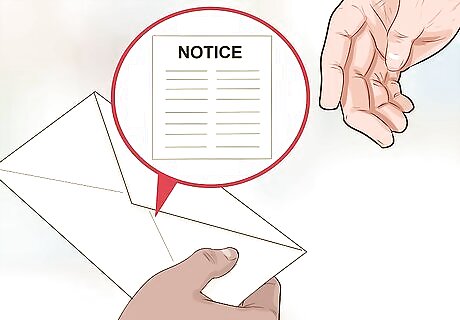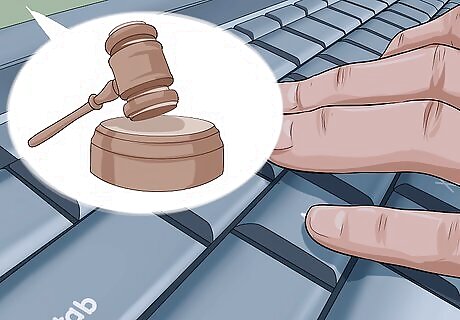
views
X
Research source
Child support can cover the child's basic necessities, medical expenses, educational expenses, and other expenses that are allowed by law.[2]
X
Research source
In Pennsylvania, child support is calculated based on the income and certain expenses of both parents.[3]
X
Research source
Filing for child support involves filing court documents, going to court, and enforcing any order for child support you receive. Follow the steps below to successfully file for child support in Pennsylvania.
Understanding the Child Support Process

Determine your starting point. In some situations, the Department of Human Services, State Collection and Disbursement Unit, will file for child support on your behalf. If you apply for public assistance to help support your children, you will automatically trigger a state child support filing. If you do not have a support order, and do not qualify for state assistance, you will need to file for a support order in the courts (follow the method on filing an initial child support order). If you have an existing support order and need to collect on it, you will need to file for enforcement (follow the method on enforcing an existing order).

Estimate the amount of support using standards and thresholds. Child support is calculated based on both parties' monthly incomes and the number of persons being supported. The amount settled on will be determined by a number of guidelines provided by Pennsylvania law. One way to estimate the amount of support is to read the the guidelines set out in the Pennsylvania Code. The Code provides guidelines and examples that will give you a good idea of what support you might expect. Another way to estimate the amount of child support you might expect is to use an online child support calculator. A great calculator can be found here. This is the official calculator of the Pennsylvania Department of Human Services. Another good calculator can be found here. Click on the link and fill out the required information, including income information, insurance costs, daycare costs, and the number of children involved in the child support action.

Consider hiring an attorney. If you can afford a family law attorney, you should consider hiring one to help you navigate the legal pathway to applying for child support. See this article for directions on how to find a good family law attorney. Even if you cannot afford a full-service attorney, many attorneys provide limited services at a reasonable cost. This means you may be able to hire an attorney to prepare your documents, give you limited legal advice, or potentially even teach you about this area of the law, without having to pay the attorney to take on the entire child support process.
Filing for an Initial Child Support Order

Determine if you should file a new child support order. You should file a new child support order if you do not already have a support order for your child. This article will assume both parents are legally established, meaning it has been conclusively determined that both parties are indeed the child's parents. If this is not the case, you may need to establish paternity prior to, or concurrently with, asking for child support. Click here for good directions on how to establish paternity.

Locate the appropriate court. Once you know you need to file a new petition for child support, you will need to file your case with the Court of Common Pleas in the county where the child lives. If you have any questions about which court this might be for you, contact your local county Domestic Relations Section.

Complete the appropriate forms. You will need to print, complete, sign, and date the following three documents in order to start your process. The first document is the Application for Child or Spousal Support; the second document is the Complaint for Support; and the third document is the Intake Questionnaire. To access these documents, you will need to register and create an account with the Pennsylvania Child Support Program. To create an account, go here and click the button that says "Register Now." There is also an interactive website that will ask you a number of questions and will fill out the required documents using the information you provide. To use this interactive site to fill out the required child support forms, go here and click on the link titled "Pennsylvania Complaint for Support." You will then begin answering a number of questions regarding your situation and at the end of the questionnaire you will be given a link to your completed documents. Print these completed documents and move on to the next step.

File your documents. Once you have filled out and printed the required forms, you will take them to your local Court of Common Pleas and you will file them with the clerk of courts. The clerk will take your original documents so be sure to make copies of everything you have. In order to complete the filing process, you will need to pay a fee unless you qualify and apply for a fee waiver. The fees vary from county to county but for example, the fee in York County is $35.50. To qualify for a fee waiver, you will usually need to show proof that you are unable to pay the fee or that doing so would cause you a financial burden. You can usually show this through bank statements or pay stubs.

Serve the other party. When you serve the other party, you will hire someone (the sheriff or another competent adult) to give a copy of your filed documents to the other party to look over and respond to. To serve the other party, the person you hire must provide the required documents to them, either in person or through the mail. If you are serving someone through the mail, it must be sent by certified mail. This process must be completed within 30 days of filing your documents with the court.

Participate in discovery. Discovery is a process where you and the other party to your case can request information from each other. Discovery will only be allowed in child support cases in limited circumstances, which are determined by the presiding judge in your case. If discovery is allowed, each party may be able to ask relevant questions about earnings, insurance payments, childcare payments, and other questions related to the child support case. In general, you can ask the other party or potential witnesses to provide you with copies of documents, allow you to inspect items or property, or require them to answer questions under oath (written or oral).

Take part in mediation. Either party can request mediation, or the judge can order it without a request from either party. The court can excuse a case from mediation if the court believes there is risk to either party or if mediation will be pointless. In mediation, a neutral third party attempts to bring the parties to an agreement on the issues. There is no need to bring any evidence because the mediator does not make any decisions. The intent is for both parties to compromise so that the issues can be settled without the need for a trial. If mediation is successful, the mediator will generally prepare the proper documents, obtain the signature of each party, and submit the documents to the court. If mediation is unsuccessful, the parties will simply proceed to court. In Pennsylvania, statements made in mediation cannot be used in court, attorneys cannot be involved in mediation, and the mediator makes no statements to the court.

Attend your hearing. If mediation is unsuccessful or you do not take part in mediation, you will attend your scheduled court hearing and present your case to the judge. The case will likely proceed as follows: Each party will provide opening statements. These opening statements are simple road maps of your case and will provide the judge and the other party with information on how you plan to proceed. For more information about opening statements go here. Each party will then present their witnesses. In a child support proceeding, witnesses will most likely be employers, friends, family members, and other relevant community members. These witnesses will provide testimony to the court about things such as a party's earnings, daily responsibilities, spending habits, and any other information that will help the judge make a decision about who should pay child support and how much should be paid. Both parties will then give their closing statements, which is the last chance to give the judge a summary of the case and a statement of why the judge should rule in your favor.

Receive a ruling. Once your hearing is over, the judge will make a decision as to how much child support should be paid, if any, to the other party. Once this decision has been made, the order will be filed and the other party will be required to pay you the amount the judge decided on. The order will also provide a conditional order for the attachment of income, which will provide a method by which you can get the money you deserve in case the other party stops paying.
Enforcing an Existing Child Support Order

Determine if you have a need to enforce an existing child support order. If you have gone through the process described in the section about filing a child support order and you are not being paid what is owed, and you do not qualify for assistance from the Office of the Attorney General, you will need to file an enforcement action.

Locate the appropriate court. To start the process, you will need to file your enforcement action with the court that handled your initial child support action. However, if the paying parent has moved out of that jurisdiction, you may need to file in a jurisdiction that has control over that parent. This step will usually only be necessary where the other parent has moved out of Pennsylvania.

Complete the appropriate forms. To fill out the required forms, go here and go through the interactive process. This website will ask you a series of questions about your situation and they will use that information to fill out the required forms for you. After you have completed the questionnaire, you can download and print the completed forms.

File your documents. Take your completed and printed documents to the correct local Court of Common Pleas and file them with the clerk of courts. The clerk will take your original documents so be sure to make copies of everything you have. In order to complete the filing process, you will need to pay a fee unless you qualify and apply for a fee waiver. The fees vary from county to county but for example, the fee in York County is $35.50. To qualify for a fee waiver, you will usually need to show proof that you are unable to pay the fee or that doing so would cause you a financial burden. You can usually show this through bank statements or pay stubs. Once you have filed your documents, the clerk of courts will schedule a hearing date.

Serve the other party. When you serve the other party, you will give a copy of your filed documents for them to look over and respond to. To serve the other party, you must provide the required documents to them, either in person or through the mail. This process must be completed within 30 days of filing your documents with the court.

Attend your hearing. You will next attend your scheduled court hearing and present your case to the judge. The case will likely proceed as follows: Each party will provide opening statements. These opening statements are simple road maps of your case and will provide the judge and the other party with information on how you plan to proceed. For more information about opening statements go here. Each party will then present their witnesses. In a child support contempt proceeding, witnesses will most likely be employers, friends, family members, bank employees, and other financial officers. These witnesses will provide testimony to the court about why the other party is not paying the required amounts. Both parties will then give their closing statements, which is the last chance to give the judge a summary of the case and a statement of why the judge should rule in your favor. Finally, the judge will provide both parties with a ruling. If the ruling is in your favor, the court will use various enforcement methods including passport denial, driver's license suspension, and credit bureau reporting in order to force the other party to pay their fair share of child support.



















Comments
0 comment